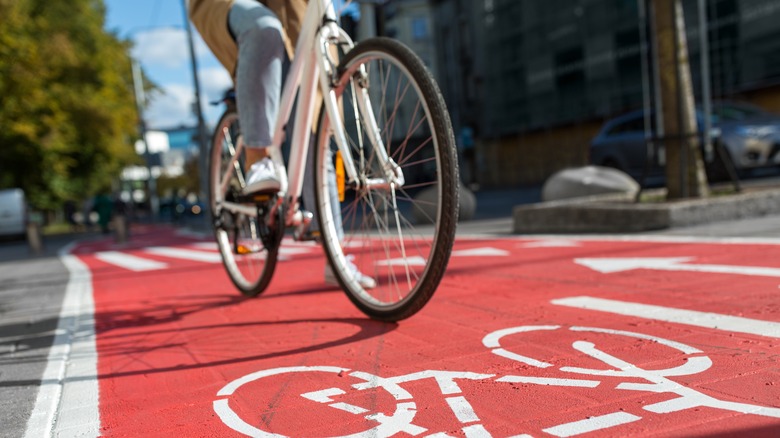The Science Behind Why We Always Remember How To Ride A Bike
For millions around the world, cycling is absolutely indispensable. It's an eco-friendly mode of transportation, a valuable form of exercise, an awful lot of fun as a hobby, and a window to all manner of sports, too. (Never mind that 19th century doctors made up an illness to scare women away from bicycling.)
Though some may take quick cycles to work or as a wind-whipping release in the mornings or evenings, elite cyclists are another breed entirely. In August 2020, Cycling Weekly reported that the fastest time recorded at the illustrious Tour de France since 2009 was Chris Froome's lightning-fast performance in 2017. In pursuit of ultimate victory, Froome achieved an average speed of 41 kilometers per hour (around 25.5 miles per hour). Per Statista, this time was topped at the 2021 contest, with the winner's average speed rising to 41.17 kilometers per hour (approximately 25.6 miles per hour).
Naturally, though, only a select few cyclists rise to these great heights. According to Cycling News, the average approximate price of a Tour de France bicycle is around $13,000 to $16,000. Outside of this super-competitive world, cycling can be a casual thing, and one that sticks with us for life. Even if we've been pedal-free for some time, many famously find that riding a bike again comes completely naturally to them. There's a fascinating scientific reason for this, too.
How the brain stores memories
Most of us who have gotten to grips with bicycles and successfully tamed them probably have a story or two about the experience. It's certainly not easy at first. Accidents, injuries, and tentative, wobbly falls into the neighbor's begonias can often color the experience of learning to ride. It takes practice, dedication, safety gear, and perhaps training wheels to master the liberating art of cycling.
The reason, it seems, relates to the ways in which the brain tackles different types of memories. Per How Stuff Works, short-term memories are things like strings of numbers, which can be tricky to retain unless we use specific methods (clever acronyms, repetition, or similar). However, the brain has the capacity to store long-term memories much better. It is, in short, the area of the brain in which cycling knowledge is stored that we can thank for our ability to retain it.
Scientific American reports that long-term memories can be separated into either procedural (which includes riding a bike, for example) or declarative. The latter, in turn, is divided into further categories. One of them is semantic memories; figures, dates, and facts, which we can (hopefully) bring to bear during examinations. It is our procedural memory, however, that we have to thank for the phenomenon of always remembering how to ride bikes.
The memories that stick with us
As Heathline reports, damage sustained by the brain is a complex issue. Depending on the region affected, the extent of the damage, and so on, effects and symptoms can be very different. Damage sustained by the temporal lobe, according to the outlet, can cause memory loss, as this is the area where memories are stored.
Scientific American states that procedural memories tend to stick around for longer, and are not likely to be lost even by damage to the brain. Such memories, it seems, are dealt with by the basal ganglia in the center of the brain. As a result, they are less vulnerable to damage.
Such memories, then, could be considered the longest long-term memories we tend to have. This doesn't mean that those who are semi-practiced at playing the guitar could pick one up many years later and play just as well as they did before (practice makes perfect and reinforces memories, after all). But we do have a general advantage in this regard. It doesn't appear clear why, but Ruhr University Bochum neuropsychologist Boris Suchan suggests in Scientific American, "According to one idea, in the regions where movement patterns are anchored fewer new nerve cells may be formed in adults. Without ... continuous remodeling in those regions, it's less likely for those memories to get erased."


